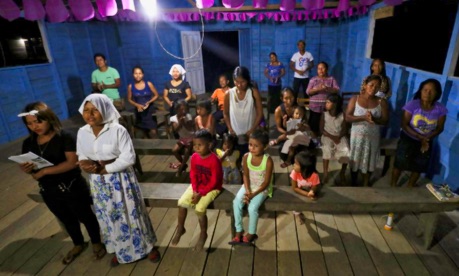It is amazing what a synod can do for a person.
German Bishop Fritz Lobinger, a 90-year-old retired missionary bishop in South Africa, has suddenly become the talk of Rome.
Lobinger’s idea of ordained elders in order to provide local communities regular access to the sacraments has been the root of discussions about “married priests” that have dominated headlines about the Synod on the Amazon, the three-week summit of bishops which began this week at the Vatican.
This is a pressing issue in the region – some areas have only one priest per 15,000 Catholics, with priests forced to travel by canoe to reach isolated communities.
Some people might not see a priest for a year, leaving lay catechists to conduct Sunday scripture services, as well as to preside over baptisms and marriages.
At the same time, there has been strong resistance to the idea of abandoning the rule of celibacy for priests in the Latin Rite.
Lobinger’s revolutionary idea is an attempt to square the circle on the issue.
The bishop – who also faced a lack of priests in his remote diocese – has for decades advocated ordaining married men, or “elders” to the priesthood, but with a twist: They would not be clerics in the ordinary sense.
The “elders,” although technically ordained, would not even be called priests and would work under a series of limitations: They would only be allowed to serve in their local community, would not receive a seminary education, would not wear clerical dress.
In other words, these “elders” would be married men with jobs, taking weekend courses for a couple of years before being ordained.
These “elders” would be guided by the seminary-educated, celibate priests.
Lobinger’s idea is a bit of a departure from the traditional idea of viri probati – Latin for “tested men” – where some select older men might be allowed to be ordained to the priesthood without going through the same extensive formation as other priests.
This proposition predates the current married priest debate, and was originally proposed for older, celibate men in mission territories who were too old to have gone through a formation process that regularly began when a man was in their early teens.
Nowadays, it is used exclusively to refer to married candidates.
The viri probati might labor under certain restrictions – perhaps not allowed to serve as a pastor or even be allowed to preach a homily – but they would still be priests.
In many ways, the viri probati are conceptually similar to the “simplex priest” of religious houses before Vatican II, who could celebrate Mass but not hear confessions or preach sermons.
Lobinger instead says there should be two different forms of priesthood, as distinct as possible.
And herein lies the real revolution being proposed. Continue reading
- Image: AP News
News category: Analysis and Comment.




